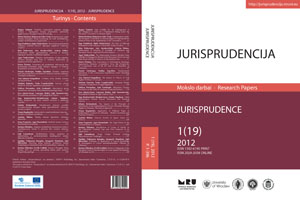Nacionalinių parlamentų vaidmens pokyčiai Europos Sąjungoje įsigaliojus Lisabonos sutarčiai
The Role of National Parliaments in the European Union after Treaty of Lisbon
Author(s): Inga Daukšienė, Sigita MatijošaitytėSubject(s): Law, Constitution, Jurisprudence
Published by: Mykolas Romeris University
Keywords: national parliaments; principle of subsidiarity; legislation; the Lisbon Treaty; Early Warning System
Summary/Abstract: After coming into force of the Treaty of Lisbon it is acknowledged that better control and respect of the principle of subsidiarity is one of the most important and innovative goals of the Treaty. To achieve this goal, the Treaty introduces a mechanism which, apart from checking compliance of draft legislative acts with that principle, may eventually lead to a draft act to be deleted from the legislative agenda of the European Union on grounds of violation of subsidiarity. Within this mechanism, crucial role is attributed to the national parliaments of the Member States. In this article, the reasons for overall inclusion of national parliaments in the European Union (hereinafter EU, the Union) activities are analysed. The role of national parliaments in the EU according to the specific provisions of the EU treaties is also discussed and the largest part of the work is devoted to the ex ante subsidiarity principle control mechanism (the Early Warning System), which gives the right for the national parliaments to influence the EU legislative process.
Journal: Jurisprudencija
- Issue Year: 19/2012
- Issue No: 1
- Page Range: 31-47
- Page Count: 18
- Language: English

